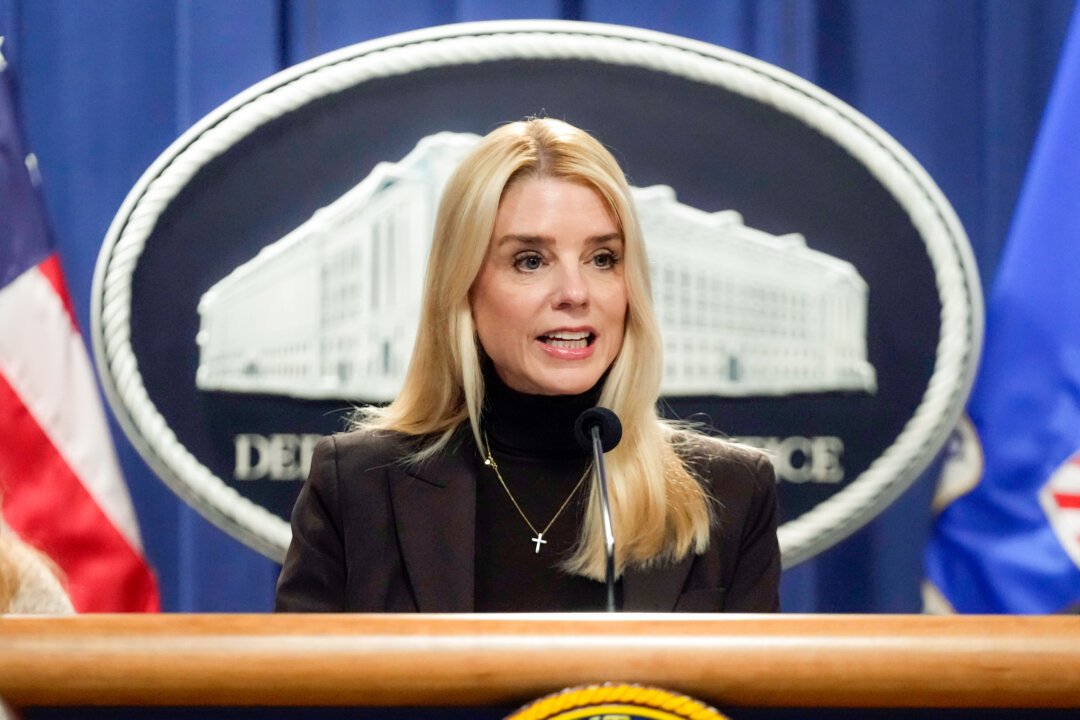Kilmar Abrego Garcia, an alleged member of MS-13 and an illegal immigrant deported to El Salvador, will not be coming back to the United States, Bondi says.
Attorney General Pam Bondi said Wednesday that Kilmar Abrego Garcia—the Salvadoran man mistakenly deported by the Trump administration in March despite a court order protecting him—will not be returning to the United States.
“He is not coming back to our country. President Bukele said he was not sending him back. That’s the end of the story,” Bondi told reporters at an April 16 press conference in Washington, referring to remarks made earlier this week by El Salvador’s president, Nayib Bukele, who rejected the idea of returning him.
“If he wanted to send him back, we would give him a plane ride back,“ Bondi said. ”There was no situation ever where he was going to stay in this country. None, none.”
Abrego Garcia, a 29-year-old illegal immigrant and alleged MS-13 gang member from El Salvador, was arrested on March 12 and three days later was placed on a deportation flight to El Salvador.
Before his deportation, Abrego Garcia had been living in Maryland with his U.S. citizen wife and children. In 2019, an immigration judge granted him “withholding of removal” status after finding he faced credible threats from the rival Barrio 18 gang if deported.
Immigration and Customs Enforcement (ICE) has said that Garcia’s removal was an “administrative error,” acknowledging it had been aware of the court-ordered protection and failed to flag it properly on the flight manifest. Garcia remains detained in El Salvador at a facility that houses individuals accused of terrorism.
At Wednesday’s press conference, Bondi acknowledged the mistake, saying that “one additional step in paperwork” had been missed. She also said the deportation was ultimately justified.
“He’s from El Salvador. He’s in El Salvador. And that’s where the president plans on keeping him,” she said.
Bondi said Garcia is a member of MS-13, a transnational criminal organization recently designated by the U.S. government as a foreign terrorist group.
“He would have come back, had one extra step of paperwork and gone back again,” Bondi said of what would happen if Garcia were to be returned to the United States.
The Department of Homeland Security (DHS) echoed that point in a court filing on Tuesday, stating that if Garcia were returned, he would be taken into custody and either deported to a third country or have his legal protection revoked and be sent back to El Salvador.
Garcia’s attorneys said there is no credible evidence linking him to MS-13. They filed suit to compel his return, arguing that the government had violated a standing court order. A federal judge agreed and directed officials to bring him back, prompting an emergency appeal from the Justice Department.
In response, the Supreme Court temporarily paused the lower court’s order on April 7, but it did not overturn it. Three days later, the Supreme Court clarified that the federal government must “facilitate” Garcia’s release from custody in El Salvador to ensure that his case proceeds as it would have had he not been improperly deported.
Since then, the administration has been providing daily status updates to the Maryland judge overseeing the case. Bondi said Wednesday that the U.S. government’s responsibility ends with offering transportation, should El Salvador choose to release him.
In an April 15 status update, DHS said it lacked authority to “forcibly extract an alien from the domestic custody of a foreign sovereign nation.”
Salvadoran President Bukele rejected the idea during an April 14 visit to the White House. “How can I smuggle a terrorist into the United States?” he said. “I’m not going to do it. The question is preposterous.”
On April 15, U.S. District Judge Paula Xinis granted expedited discovery in the case, writing that federal officials had “done nothing at all” to facilitate Garcia’s release or return, as required by the Supreme Court.
Rejecting the government’s narrow reading of its obligations, Xinis emphasized that “facilitate” means “aiding, assisting, or making easier” Garcia’s release and ensuring his case is handled as it would have been “had he not been improperly sent to El Salvador.”

